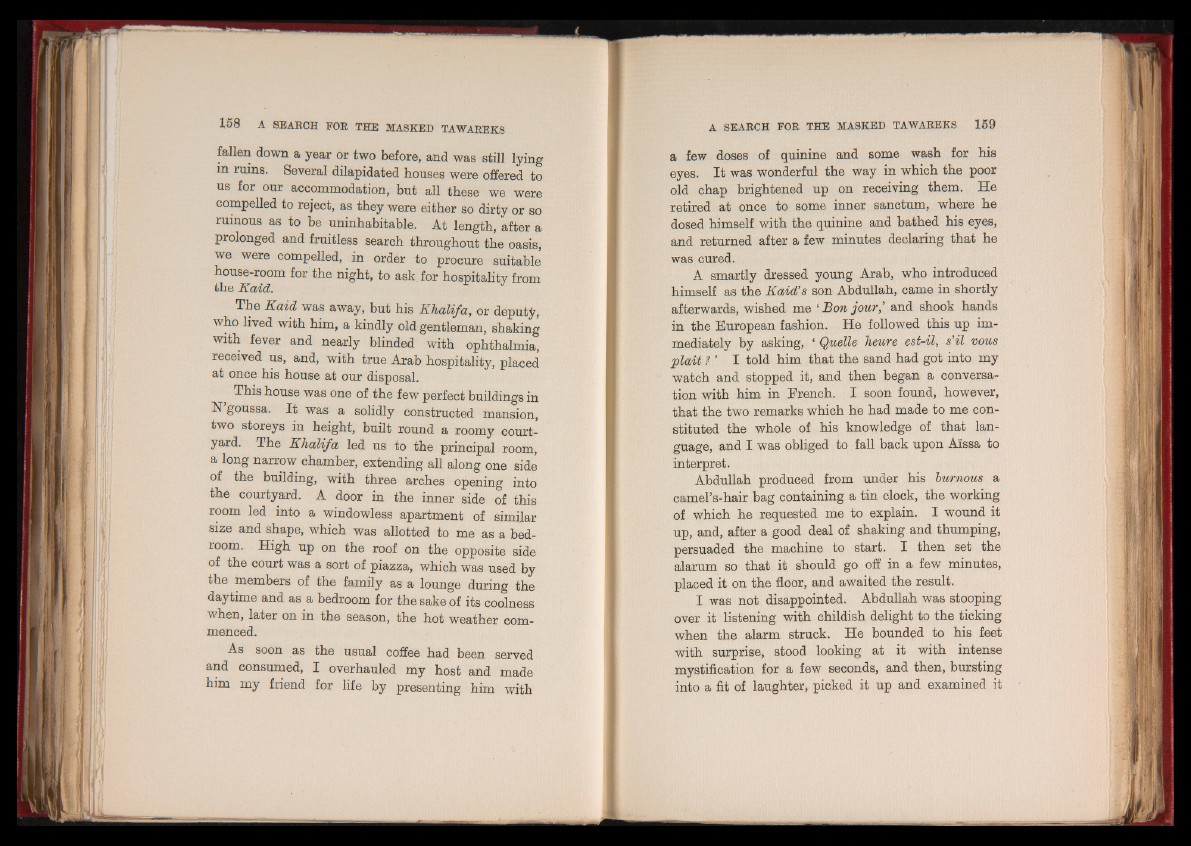
fallen down a year or two before, and was still lying
in ruins. Several dilapidated houses were offered to
us for our accommodation, but all these we were
compelled to reject, as they were either so dirty or so
ruinous as to be uninhabitable. At length, after a
prolonged and fruitless search throughout the oasis,
we were compelled, in order to procure suitable
house-room for the night, to ask for hospitality from
the Kaid.
The Kaid was away, but his Khalifa, or deputy,
who lived with him, a kindly old gentleman, shaking
with fever and nearly blinded with ophthalmia,
received us, and, with true Arab hospitality, placed
at once his house at our disposal.
This house was one of the few perfect buildings in
N goussa. It was a solidly constructed mansion,
two storeys in height, built round a roomy courtyard.
The Khalifa led us to the principal room,
a long narrow chamber, extending all along one side
of the building, with three arches opening into
the courtyard. A door in the inner side of this
room led into a windowless apartment of similar
size and shape, which was allotted to me as a bedroom.
High up on the roof on the opposite side
of the court was a sort of piazza, which was used by
the members of the family as a lounge during the
daytime and as a bedroom for the sake of its coolness
when, later on in the season, the hot weather commenced.
As soon as the usual coffee had been served
and consumed, I overhauled my host and made
him my friend for life by presenting him with
a few doses of quinine and some wash for his
eyes. It was wonderful the way in which the poor
old chap brightened up on receiving them. He
retired at once to some inner sanctum, where he
dosed himself with the quinine and bathed his eyes,
and returned after a few minutes declaring that he
was cured.
A smartly dressed young Arab, who introduced
himself as the Kaid’s son Abdullah, came in shortly
afterwards, wished me ‘ Bon jour,’ and shook hands
in the European fashion. He followed this up immediately
by asking, ‘ Quelle heure est-il, s’il vous
plait ? ’ I told him that the sand had got into my
watch and stopped it, and then began a conversation
with him in French. I soon found, however,
that the two remarks which he had made to me constituted
the whole of his knowledge of that language,
and I was obliged to fall back upon Aissa to
interpret.
Abdullah produced from under his burnous a
camel’s-hair bag containing a tin clock, the working
of which he requested me to explain. I wound it
up, and, after a good deal of shaking and thumping,
persuaded the machine to start. I then set the
alarum so that it should go off in a few minutes,
placed it on the floor, and awaited the result.
I was not disappointed. Abdullah was stooping
over it listening with childish delight to the ticking
when the alarm struck. He bounded to his feet
with surprise, stood looking at it with intense
mystification for a few seconds, and then, bursting
into a fit of laughter, picked it up and examined it